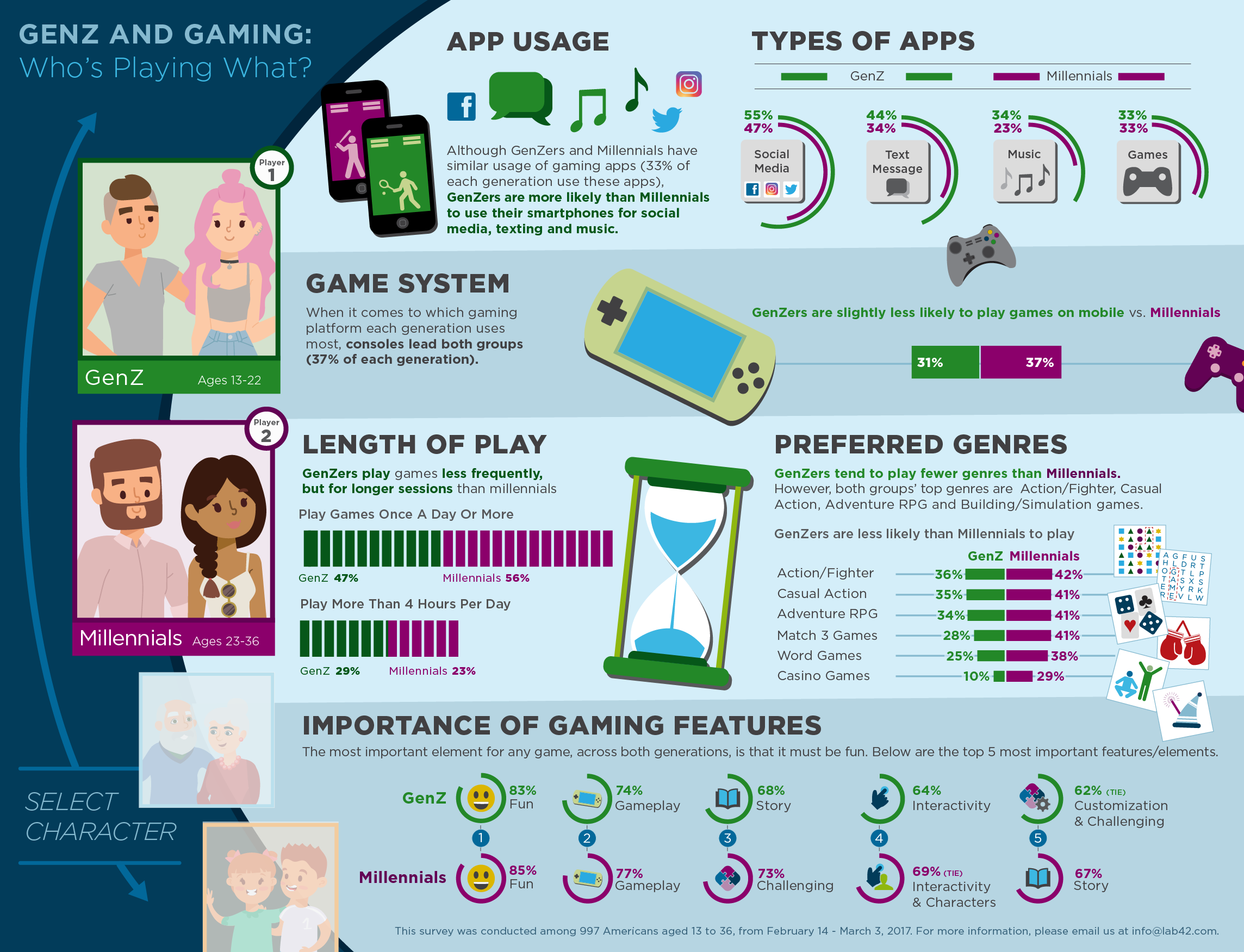GenZ & Gaming - Who's Playing What?
Earlier this year, Lab42 conducted internal quantitative research to glean deep insights into the GenZ Generation (13-22 year olds), and how this generation compares and contrasts to Millennials (23-34 year olds), GenX (35-54 year olds) and Baby Boomers (55+ year olds). You can check out our earlier report, 'A Snapshot of How GenZ & Millennials Interact with Brands'. This report focuses on GenZ & Gaming.GenZ'ers gaming habits differ from Millennial’s across many areas – from what they play and the platforms used, to how frequently they play and how much they spend, indicating that gaming companies need to consider how to best approach and how to best monetize GenZ. In addition, male and female GenZ gaming habits differ significantly, indicating that different strategies may be needed for each group.
GenZ'ers tend to prefer console games:
90% of GenZ'ers play some type of game (mobile/console/PC), with most claiming playing console games (37%) vs. mobile games (31%). On the other hand, Millennials play both platforms equally (37%).
GenZ'ers play games less frequently, but more hours at a time:
GenZ'ers do not play games as frequently as Millennials do, only 48% of GenZ'ers play games once a day or more vs. 56% of Millennials. However, when this generation plays, it is for longer periods of time: 29% play more than 4 hours a day vs. 23% of Millennials.
Though GenZ'ers are as likely as Millennials to use gaming apps, they are more likely than Millennials to also use their smartphones for Social Media, texting and music.
GenZ'ers play fewer genres, focusing more on Action, Adventure, Fighter and Building/Simulation:
GenZ'ers, on average, play fewer types of games vs. both Millennials and GenX. For the most part GenZ'ers play Action/Fighter, Casual Action, Adventure RPG and Building/Simulation games. GenZ'ers are less likely to play Match 3 games, Word games, or casino games than all other generations.
"Let’s Play" is popular among GenZ, but not an activity that this generation does for many hours in a day:
GenZ is also more likely than any of the other generations to watch other people’s games: 52% vs. 47% of Millennials and 37% of GenX. However, Millennials spend more hours in a day watching other people playing games, with 48% spending more than 1 hour vs. 30% of Gen Z.
For GenZ'ers, fun, gameplay and storyline are essential game elements:
What is important to GenZ when deciding what game to play, is that the game is fun, has good gameplay and a good storyline. For Millennials and GenX however, being challenging is much more important than the storyline.
GenZ'ers are less likely to spend money on games, both to purchase and for in-app purchases:
28% do not spend any money on games vs. 18% of Millennials.
41% make in-app purchases vs. 48% of Millennials and among those who do, only 35% spend more than $10 in an average month vs. 50% of Millennials.
GenZ Women have different gaming habits than Gen Z Men
GenZ women are more of casual players vs. GenZ men. They strongly prefer to play mobile games, mostly Match 3, Puzzle, Word or Casual Action, play games less often and for shorter time.On the other hand, Gen Z males, are prefer console games, and strongly prefer Action/Fighter games. They tend to play more often and for more hours. They are also more likely to make in-app purchases.
Check out our ‘GenZ & Gaming: Who's Playing What?’ infographic below. If you’re interested in learning more or receiving the full GenZ & Gaming report, please contact us.

